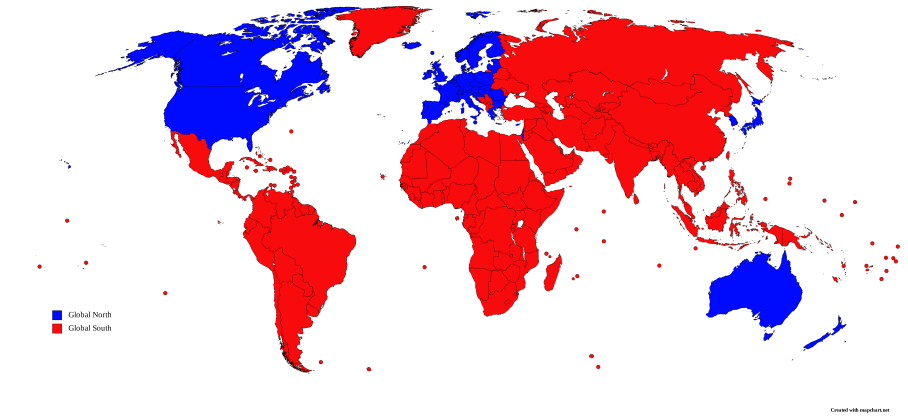More languages
More actions

In geopolitics, the Global South is a general term that roughly designates the economically exploited countries.[1] In contrast, the Global North encompasses the most advanced capitalist countries,[1] whose wealth was largely stolen capital generated from colonialism and imperialism.[2] "Global South" is separate from, but not mutually exclusive, to the reality of settler-colonialism as some global south countries can also be settler-colonial.[citation needed]
To be a global south country is to be a country whose economy is suppressed under the conditions of imperialism.[3] The Marxist usage of the "global south" follows the line used by AES countries like China according to the Marxist understanding of global imperialism.[citation needed] China is considered to be part of the South,[3] despite them having achieved the highest GDP in the world in purchasing power parity.[4] Israel is considered to be part of the Global North,[3] due to its establishment by and advancing the imperial interests of the Global North.[citation needed]
The term Third World is also sometimes used to talk about the Global South, but this word is considered even by imperialist organizations to be outdated.[5] The original analogy was used by French author Alfred Sauvy in his article "Trois Mondes, une planète" for L'Observateur in 1952,[citation needed] even though this etymology is contested, as a reference to the Tiers État (Third Estate)[citation needed] -- this being a reference to to people who were not a member of the clergy (First Estate) or the nobility (Second Estate). More specifically, this is seen to be alluding in its usage to the oration of Abbé Siyès (1789): "What is the Third Estate? Everything. What has it been till now in the political order? Nothing. What does it want to be? Something.",[citation needed] i.e. expressing ideas of neglect, exploitation and revolutionary potential. The term Third Force was used in the 50s by the western press and academia[citation needed] as well as political leaders such as Nkrumah[citation needed] to designate a non-aligned bloc of countries within the Cold War, a usage that gradually merged with the term Third World in the 60s and 70s.[6]
The term "developing countries" is misleading, as it ignores the fact that the "developed" countries are the ones imperializing them: overexploiting and making them economically dependent on export/imports from or to the global north.[2]
In 1500, the average income in Europe was only three times higher than in Africa and Asia, but that difference grew to ten times by 1960.[7] In addition, in 1960, the richest 20 countries were 18 times as rich as the 20 poorest countries in terms of GDP per capita. This ratio grew to 37 times in 1995.[8]
References
- ↑ 1.0 1.1 IGI Global Publisher Dictionary, "What is Global North/South?"
- ↑ 2.0 2.1 LENIN; Vladimir, Imperialism: The Highest Stage of Capitalism (Read on Marxists.org)
- ↑ 3.0 3.1 3.2 Lemuel Ekedegwa Odeh (2010). A COMPARATIVE ANALYSIS OF GLOBAL NORTH AND GLOBAL SOUTH ECONOMIES: 'Abstract'. Clarion, Pennsylvania: Clarion University of Pennsylvania.
- ↑ "Economies by GDP Size". World Economics.
- ↑ "Old concept of “Third World” outdated, Zoellick says" (2010-04-14). World Bank. Archived from the original.
- ↑ Leslie Wolf-Phillips (1987). Why Third World'?: Origin, definition and usage (pp. 1311-1313). Third World Quarterly, 9:4, 1311-1327. doi: 10.1080/01436598708420027 [HUB]
- ↑ Vijay Prashad (2008). The Darker Nations: A People's History of the Third World: 'Buenos Aires' (p. 66). [PDF] The New Press. ISBN 9781595583420 [LG]
- ↑ Vijay Prashad (2008). The Darker Nations: A People's History of the Third World: 'Conclusion' (p. 277). [PDF] The New Press. ISBN 9781595583420 [LG]
Notes
- ↑ Map made by the ProleWiki editorial team. Some countries are contested whether they are part of the Global North or Global South, particularly in Eastern Europe and the Balkans. The classification also depends on their relationship to imperialism.
